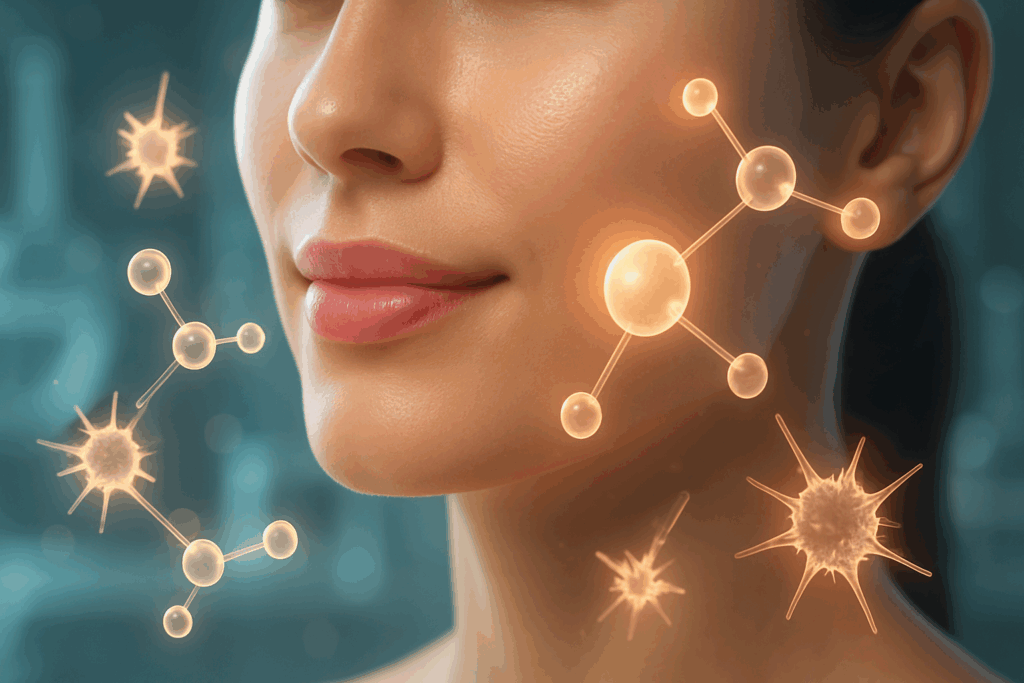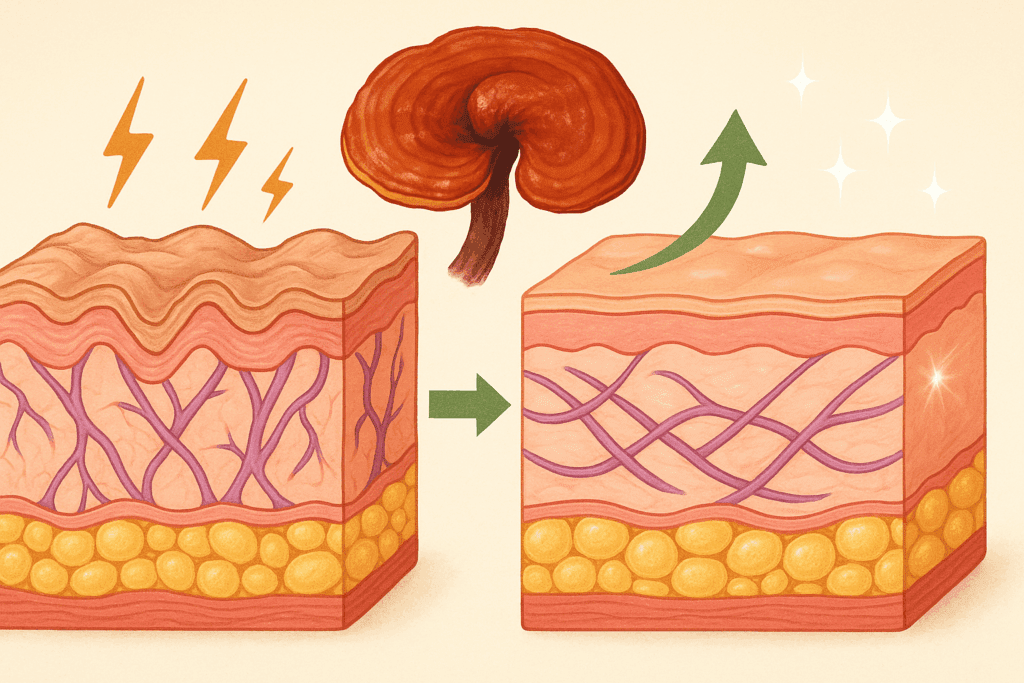Introduction: A New Era of Holistic Wellness
In the modern world, where the pressures of daily life increasingly weigh upon both mind and body, holistic approaches to wellness have gained unprecedented attention. Among the vast array of natural remedies making headlines, few have demonstrated the resilience and profound versatility of the reishi mushroom. Known scientifically as Ganoderma lucidum and revered for centuries in traditional Eastern medicine, reishi mushrooms have recently sparked a global renaissance of interest, particularly regarding their influence on skin health and stress management. Today, scientific inquiry and traditional wisdom intertwine to highlight the impressive reishi mushroom benefits for skin, positioning this adaptogenic powerhouse as a vital ally in elevating one’s overall well-being.
As we explore this ancient remedy’s intricate relationship with stress, skin, and systemic health, it becomes evident that reishi offers far more than superficial enhancement. It delves into the roots of imbalance—oxidative stress, inflammation, and immune dysfunction—offering a multifaceted path toward renewal. This article embarks on a comprehensive journey through the rich history, emerging science, and transformative potential of reishi mushrooms, elucidating how their adaptogenic properties can harmonize your stress-relief practices while simultaneously revitalizing your skin from within.
Ultimately, the transformative potential of reishi mushrooms transcends cosmetic enhancement. It taps into a deeper philosophy of beauty that emphasizes inner balance, systemic health, and mindful self-care. By integrating reishi supplementation into a comprehensive wellness routine, individuals can experience not only the visible reishi mushroom benefits for skin but also the profound emotional and physiological harmony that reflects true holistic healing.
You may also like: The Essential Guide to Reishi Mushroom Benefits: How to Use Reishi Mushroom Powder for Stress Relief and Adaptogenic Support

Ganoderma Benefits for Skin: A Deeper Scientific Look
When investigating the wide array of ganoderma benefits for skin, it becomes clear that this revered mushroom addresses skin health through multiple physiological pathways. At the forefront is ganoderma’s ability to mitigate oxidative stress, a principal driver of premature aging and dermal deterioration. Oxidative stress occurs when free radicals overwhelm the body’s antioxidant defenses, leading to cellular damage, collagen breakdown, and the formation of fine lines and wrinkles. The potent antioxidant compounds in Ganoderma lucidum work synergistically to neutralize these reactive oxygen species, preserving the structural integrity of skin tissues and maintaining a youthful, vibrant appearance.
In addition to antioxidant action, Ganoderma lucidum exerts immunomodulatory effects that contribute to skin resilience. Healthy skin is, in part, the result of a well-regulated immune response, one that can effectively ward off pathogens without triggering excessive inflammation. Chronic, low-level inflammation has been implicated in a variety of skin disorders, including rosacea, eczema, and psoriasis. By fine-tuning immune activity, ganoderma promotes an environment that supports skin healing, reduces hypersensitivity, and fosters an even skin tone free from persistent redness or irritation.
Moreover, the polysaccharide components in Ganoderma lucidum have demonstrated promising results in enhancing dermal hydration. Maintaining optimal hydration is vital for preventing transepidermal water loss, preserving skin elasticity, and minimizing the appearance of pores and rough texture. These polysaccharides act as humectants, drawing moisture into the skin and helping to create a supple, smooth surface. Thus, the ganoderma benefits for skin encompass not only visible aesthetic improvements but also a profound reinforcement of the skin’s foundational health.
Lastly, Ganoderma lucidum’s capacity to support detoxification processes offers indirect yet meaningful advantages for the skin. The liver, often referred to as the body’s primary detox organ, plays a critical role in filtering out toxins that could otherwise manifest in the skin through blemishes, dullness, or irritation. By promoting hepatic health and enhancing detoxification pathways, Ganoderma lucidum indirectly contributes to a clearer, more luminous complexion, reinforcing the time-honored belief that true beauty begins within.

Understanding Lingzhi Benefits for Skin Health and Radiance
To fully appreciate the myriad ways in which Lingzhi benefits for skin manifest, one must first understand the holistic philosophy underpinning its traditional use. In Traditional Chinese Medicine, Lingzhi was revered not merely for its superficial effects but for its ability to harmonize the internal systems that ultimately govern external appearance. A balanced mind, resilient immune system, and robust circulation were all considered prerequisites for healthy, radiant skin. Today, modern scientific investigations affirm that these ancient insights were remarkably prescient.
One of the key Lingzhi benefits for skin lies in its ability to regulate inflammatory pathways. Chronic inflammation is a silent aggressor in the aging process, contributing to collagen degradation, impaired barrier function, and the exacerbation of chronic skin conditions. Research shows that bioactive compounds in Lingzhi, such as ganoderic acids and polysaccharides, exert powerful anti-inflammatory effects by modulating cytokine production and reducing oxidative damage. This dual-action approach ensures that inflammation is kept in check, allowing skin to maintain its structural integrity and youthful resilience.
Furthermore, Lingzhi’s rich array of antioxidants—including phenolic compounds and polysaccharides—provides robust protection against environmental stressors. UV radiation, pollution, and chemical exposures generate free radicals that accelerate dermal aging. By scavenging these harmful molecules, Lingzhi not only prevents immediate cellular damage but also supports the long-term preservation of skin health. This protective effect is particularly valuable in today’s urban environments, where environmental pollutants pose a growing threat to skin vitality.
An often-overlooked aspect of Lingzhi benefits for skin involves its impact on microcirculation. Adequate blood flow is essential for delivering oxygen and nutrients to skin tissues, facilitating repair, and maintaining a vibrant, healthy complexion. Compounds within Lingzhi have been shown to enhance vascular function, promoting better nutrient delivery and waste removal at the cellular level. The result is skin that appears not just healthier but genuinely energized from within, with a noticeable improvement in tone, texture, and luminosity.
Thus, the traditional reverence for Lingzhi as a beautifying herb finds strong resonance in contemporary biomedical science. By addressing the root causes of skin dysfunction—oxidative stress, inflammation, impaired circulation—Lingzhi offers a comprehensive strategy for achieving and maintaining radiant skin in an increasingly challenging world.

Ganoderma Lucidum Skin Benefits: What Research Reveals
As scientific exploration into natural compounds intensifies, the body of evidence supporting Ganoderma lucidum skin benefits continues to expand. Researchers have delved into the molecular composition of this ancient mushroom, uncovering a complex symphony of bioactive constituents that can profoundly impact skin physiology. Among the most noteworthy of these are the triterpenoids, known for their potent anti-inflammatory and antioxidant capabilities, which directly combat the mechanisms underlying skin aging and dermal degeneration. These compounds help preserve collagen integrity, prevent elastin degradation, and reduce visible signs of oxidative stress, including wrinkles, discoloration, and dullness.
Further investigations reveal that polysaccharides extracted from Ganoderma lucidum stimulate the proliferation of fibroblasts—cells responsible for generating collagen and extracellular matrix components vital for skin elasticity and repair. By fostering fibroblast activity, Ganoderma lucidum supports the skin’s natural regenerative processes, promoting smoother texture and improved resilience against environmental stressors. This regenerative capacity is particularly significant for individuals seeking to counteract the cumulative damage associated with sun exposure, pollution, and lifestyle-induced aging.
In addition, recent studies suggest that Ganoderma lucidum exerts a protective effect against ultraviolet (UV) radiation, one of the primary accelerators of skin aging and carcinogenesis. Extracts from the mushroom have demonstrated the ability to mitigate UV-induced oxidative damage at the cellular level, reducing DNA fragmentation, inflammation, and matrix metalloproteinase activity that would otherwise lead to collagen breakdown. By acting as a natural photoprotective agent, Ganoderma lucidum offers a supplementary layer of defense for individuals exposed to daily environmental insults.
Moreover, the immunomodulatory effects of Ganoderma lucidum extend to the skin’s surface immune mechanisms, enhancing the barrier’s ability to fend off microbial threats and allergenic triggers. A robust skin immune system is crucial for maintaining dermal homeostasis and preventing the onset of conditions such as atopic dermatitis or contact dermatitis. Through this multifaceted support of structural, cellular, and immune functions, Ganoderma lucidum skin benefits emerge as a powerful testament to nature’s potential to nurture and restore.
Ultimately, the emerging research landscape surrounding Ganoderma lucidum not only corroborates ancient therapeutic claims but also opens new avenues for innovative skincare formulations. By integrating Ganoderma lucidum into topical preparations and internal wellness routines, individuals can unlock a profound level of dermal vitality rooted in the wisdom of nature and validated by contemporary science.

Reishi Skin Benefits in Stress-Relief Routines: A Practical Guide
Integrating reishi mushrooms into your daily stress-relief routine can significantly amplify both inner balance and outward skin radiance. A foundational step is to select a high-quality reishi supplement—preferably one standardized for its polysaccharide and triterpenoid content, as these bioactive compounds deliver the strongest therapeutic effects. Many individuals find that incorporating a reishi capsule or powder into their morning or evening regimen offers a convenient and effective means of supporting systemic resilience over time.
For those aiming to maximize reishi skin benefits in stress-relief routines, it is equally important to combine internal supplementation with mindful self-care practices. Chronic stress can deplete the body’s resources and disrupt the skin’s natural regenerative processes. Techniques such as meditation, deep breathing exercises, and gentle yoga help modulate the nervous system, creating an environment where reishi’s adaptogenic qualities can work more efficiently. As stress hormone levels, particularly cortisol, decrease, the skin’s barrier function strengthens, inflammation subsides, and cellular repair accelerates.
Topical skincare products containing reishi extracts further enhance results. Modern formulations often include concentrated reishi alongside complementary botanicals like hyaluronic acid or green tea, delivering targeted antioxidant protection directly to the skin’s surface. Applying these products after cleansing and before moisturizing allows reishi’s polysaccharides and triterpenes to soothe irritation, promote hydration, and defend against environmental aggressors that compound stress-induced skin issues.
Another often overlooked aspect of reishi’s integration into stress management is the importance of sleep quality. Reishi mushrooms have been traditionally used to support restful sleep by modulating GABAergic pathways in the brain. Prioritizing a consistent evening routine that incorporates reishi tea or supplements can deepen sleep cycles, allowing the body’s overnight repair mechanisms to rejuvenate the skin more effectively.
Ultimately, weaving reishi into your daily rituals offers a profound synergy between mind-body wellness and aesthetic vitality. The adaptogenic support that calms the mind simultaneously empowers the skin to reflect greater health, harmony, and resilience. Over time, the combined effects of stress reduction and enhanced dermal defense systems can produce visibly brighter, smoother, and healthier skin—making reishi an indispensable ally for both inner and outer transformation.
Frequently Asked Questions About Reishi Mushroom Benefits for Skin
How Do Reishi Mushroom Benefits for Skin Compare to Other Adaptogens?
While many adaptogens like ashwagandha and holy basil offer stress-relief, reishi mushroom benefits for skin are particularly unique due to their potent polysaccharide and triterpenoid content. These compounds specifically target oxidative stress and inflammation, which are key factors in premature skin aging. Unlike some adaptogens that mainly influence hormonal balance, reishi mushrooms exert direct effects on the skin’s immune resilience and hydration retention. This dual action makes them highly effective for individuals seeking both inner calm and outer radiance. Additionally, reishi’s support for microcirculation offers an advantage not typically associated with other adaptogens.
What Makes Ganoderma Benefits for Skin Particularly Effective for Sensitive Skin Types?
Ganoderma benefits for skin extend beyond basic nourishment to include a significant anti-inflammatory and soothing effect, which is crucial for sensitive or reactive skin. The triterpenes found in Ganoderma lucidum help to modulate cytokine activity, reducing redness and discomfort without suppressing healthy immune responses. Unlike conventional products that often rely on steroids or harsh chemicals, Ganoderma-based interventions offer a natural alternative for calming irritation. Emerging research also suggests that Ganoderma polysaccharides enhance the skin’s barrier function, strengthening resilience against allergens and pollutants. This makes Ganoderma an ideal ingredient for skincare targeted at sensitive demographics.
Can Reishi Mushrooms Improve the Appearance of Hyperpigmentation?
Yes, reishi mushroom benefits for skin include a potential role in addressing hyperpigmentation. The mushroom’s antioxidants, particularly ganoderic acids, may inhibit tyrosinase activity—an enzyme critical in melanin production. By reducing oxidative stress and calming inflammatory processes, reishi can help even out skin tone over time. While it is not a replacement for professional dermatological treatments, consistent use of reishi-based products can complement brightening regimens effectively. Individuals concerned about post-inflammatory hyperpigmentation may especially benefit from combining reishi supplements with topical applications.
How Do Ganoderma Lucidum Skin Benefits Support the Skin’s Microbiome?
Ganoderma lucidum skin benefits extend to supporting a healthy and diverse skin microbiome, which is essential for overall dermal health. Bioactive compounds in Ganoderma have been shown to promote microbial balance, encouraging the growth of beneficial organisms while inhibiting pathogenic species. A robust microbiome improves the skin’s natural defense mechanisms, helping to prevent acne, eczema, and infections. Emerging formulations are beginning to combine Ganoderma extracts with prebiotic ingredients for synergistic effects. Maintaining a balanced microbiome also enhances the efficacy of moisturizers and barrier repair treatments.
Are Lingzhi Benefits for Skin Affected by How the Mushroom is Processed?
Absolutely—the method of processing greatly impacts the potency of Lingzhi benefits for skin. Dual-extraction methods that utilize both hot water and alcohol yield a full spectrum of polysaccharides and triterpenoids, offering superior therapeutic effects. Products relying solely on hot-water extracts may be rich in immune-supportive compounds but lack significant antioxidant triterpenes. For maximum skin benefits, consumers should seek out dual-extracted or spore-powder formulations. The quality and sustainability of sourcing also influence the bioactivity of Lingzhi preparations.
What Are the Long-Term Effects of Using Reishi for Skin Health?
Long-term use of reishi mushrooms can lead to cumulative improvements in skin elasticity, hydration, and resilience against environmental stressors. Unlike short-term cosmetic fixes, the adaptogenic and immune-modulating properties of reishi work at a foundational level to support the skin’s regenerative processes. Over months of consistent use, many users report fewer breakouts, smoother texture, and a healthier glow. Importantly, long-term use also correlates with systemic benefits such as reduced stress markers and improved sleep, which indirectly support skin health. Thus, reishi mushrooms offer a comprehensive, sustainable approach to aesthetic and systemic wellness.
How Do Reishi Skin Benefits Extend Beyond Anti-Aging?
While reishi skin benefits are often highlighted for their anti-aging effects, they also contribute meaningfully to skin recovery and resilience. For example, individuals dealing with chronic inflammatory skin conditions, such as rosacea or atopic dermatitis, may experience symptom improvement through reishi’s immune-modulating effects. Additionally, the mushroom’s ability to enhance microvascular function aids in wound healing and overall tissue repair. Reishi’s adaptogenic properties also help the skin recover faster from UV exposure and environmental assaults. These broader benefits position reishi as a versatile ally for diverse skin concerns.
How Should One Choose Between Different Reishi Products for Skin Benefits?
Choosing the right reishi product depends on one’s primary skin health goals. For internal support, high-potency extracts standardized for triterpenoid and polysaccharide content are ideal. For external application, topical products formulated with dual-extracted reishi or reishi spore oil provide superior dermal absorption. Some emerging brands also combine reishi with complementary botanicals such as centella asiatica or licorice root to amplify soothing effects. Transparency around sourcing, extraction methods, and bioactive content should guide purchasing decisions. Reishi mushroom benefits for skin are maximized when products maintain full-spectrum integrity.
Can Ganoderma Lucidum Skin Benefits Be Enhanced Through Diet?
Yes, the effectiveness of Ganoderma lucidum skin benefits can be amplified by supporting skin health through a nutrient-dense diet. Antioxidant-rich foods such as berries, leafy greens, and fatty fish work synergistically with Ganoderma to neutralize oxidative stress. Adequate intake of vitamin C, zinc, and healthy fats is particularly important for collagen production and skin barrier integrity. Combining Ganoderma supplementation with a balanced, anti-inflammatory diet accelerates improvements in skin hydration, elasticity, and overall glow. Hydration, fiber intake, and minimizing processed foods further enhance the positive effects on skin vitality.
Are There Specific Lingzhi Benefits for Skin During Seasonal Changes?
Seasonal changes can place additional stress on the skin, and Lingzhi benefits for skin help mitigate these fluctuations effectively. During colder months, Lingzhi’s polysaccharides enhance moisture retention and strengthen the lipid barrier, preventing dryness and irritation. In warmer seasons, Lingzhi’s anti-inflammatory properties help calm heat-induced redness and minimize UV-induced oxidative stress. Regular use throughout seasonal transitions fosters adaptive resilience within the skin, reducing the risk of flare-ups or sensitivity spikes. This versatility makes Lingzhi an invaluable addition to year-round skin care strategies.

Conclusion: Embracing Reishi’s Full Spectrum of Wellness
In the ever-evolving journey toward holistic well-being, few natural remedies offer the multifaceted benefits found in reishi mushrooms. From their centuries-old reputation in Traditional Chinese Medicine to the cutting-edge research of today’s biomedical science, the reishi mushroom stands as a testament to nature’s profound healing potential. The transformative reishi mushroom benefits for skin illuminate a broader narrative—one where internal resilience and external radiance are inseparably linked.
By tapping into the powerful ganoderma benefits for skin, the ganoderma lucidum skin benefits verified by modern studies, and the traditional lingzhi benefits for skin celebrated for generations, individuals unlock a pathway to comprehensive wellness that transcends superficial beauty routines. The antioxidant, anti-inflammatory, immune-modulating, and adaptogenic properties of reishi mushrooms address the very root causes of skin deterioration and systemic imbalance.
Importantly, reishi’s ability to harmonize stress responses bridges the gap between psychological wellness and physical vitality. By reducing chronic stress burdens, enhancing sleep quality, fortifying the immune system, and promoting healthy microcirculation, reishi empowers the body to heal and flourish from within. The visible reishi skin benefits in stress-relief routines are thus a natural outgrowth of deeper physiological harmony—a reflection of inner peace made manifest through the skin’s vibrancy and strength.
Embracing reishi mushrooms is not about seeking a quick fix or miracle cure. It is a mindful, intentional commitment to nurturing one’s body, mind, and spirit through consistent self-care practices grounded in tradition and science. As we face the mounting pressures of modern life, reishi offers a vital bridge back to balance—a gentle but powerful reminder that true health begins at the cellular level and blossoms outward.
In welcoming the full spectrum of reishi’s benefits, we are not merely caring for our skin; we are honoring our deepest need for resilience, renewal, and radiant well-being.
Further Reading:
The Benefits of Reishi Mushrooms for Skin
3 Surprising Reishi Mushroom Benefits for Dry, Sensitive, and Aging Skin
